PET SURGERY AND HOSPITALIZATION SERVICES IN RAHWAY, NEW JERSEY
When choosing a surgeon for your pet, you ought to keep in mind some basic tenets of Excellence that characterize certain hospitals. In a hospital that prides itself in the area of providing excellence to the care of animals, the Clark Animal Hospital, the following steps are a must before any surgery is undertaken:
Pre Surgical Blood Test, Radiographs (X-Rays) especially for middle age to senior pets, ElectroCardioGram (ECG, also known as EKG) before the surgery, Prophylactic Antibiotic injection, Pain killer (analgesic) injection, intra-venous fluid therapy before, during and after surgery, Pulse-Oxymeter to monitor Oxygen concentration in the blood during surgical procedure, Heart rate monitor, Blood Pressure monitor, Sterile surgical pack for every surgery, monitoring of the anesthetized patient by a trained assistant, gas anesthesia for reducing anesthetic related complications, and monitoring during recovery of the patient from anesthesia.
A written document explaining post surgical home instructions is given to the owners at the time of patient discharge.
Note:
An exception is some times made for some pet owners (because of their financial constraints or other reasons) who decline and sign a waiver to the effect that they do not elect Enhanced Care for their pets and understand the risks of getting a surgery without the proper database of above mentioned tests and measures. This is less than desirable, but we do our best to make sure that all pets are safe on the surgical table and beyond.
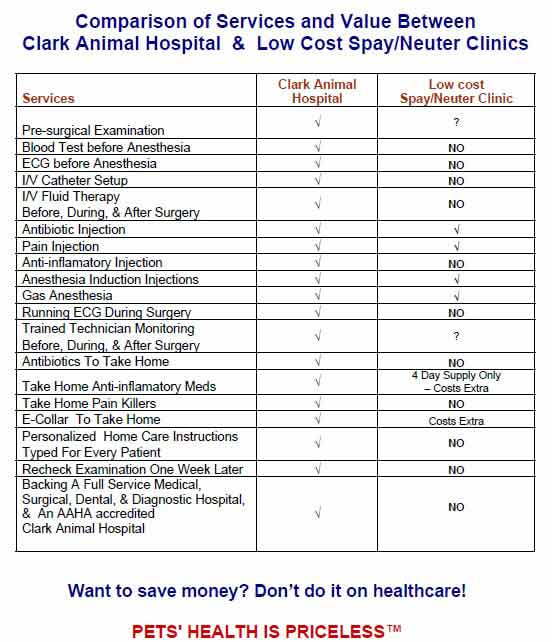
WHAT IS A SPAY PROCEDURE?
It is an operation whereby the ovaries and the uterus are surgically removed under general anesthesia. Age: We recommend it to be done between 5-7 months of age, before the first heat period to get the maximum benefit as far as prevention of mammary cancer is concerned, but can be done anytime thereafter.
Reasons to do Spay:
Prevention of heat periods and accompanying vaginal bleeding. Prevention of unwanted pregnancies. Prevention of ovarian cancer, mammary cancer, persistent heat, pyometra (pus in uterus). Pets live longer. A responsible thing to do for your pet and for society. (Millions of unwanted puppies and kittens are put to sleep every year in America, because many animals get unwanted pregnancy and there are not enough homes to adopt all these puppies and kittens)
What is meant by ovariohysterectomy or spaying?
Spaying is the common term used to describe the surgical procedure known scientifically as an ovariohysterectomy. In this procedure, the ovaries and uterus are completely removed in order to sterilize a female cat or dog.
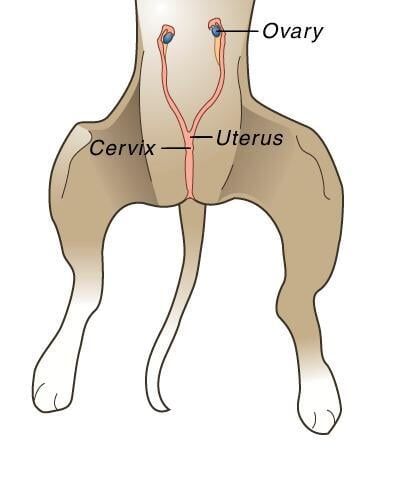
Why should I have my pet spayed?
We recommend that all non-breeding pets be sterilized. Here are several health benefits associated with spaying your pet.
- Spaying eliminates the risk of ovarian and uterine cancers.
- Breast cancer is the number one type of cancer diagnosed in intact or unspayed females.
- If your pet is spayed before her first heat cycle, there is a very minute chance of developing breast cancer.
- With every subsequent heat cycle, the risk of developing breast cancer increases.
- After 2½ years of ageovariohysterectomy gives much less protective benefit against developing breast cancer.
- Pets with diabetes or epilepsy should be spayed to prevent hormonal changes that may interfere with medications.
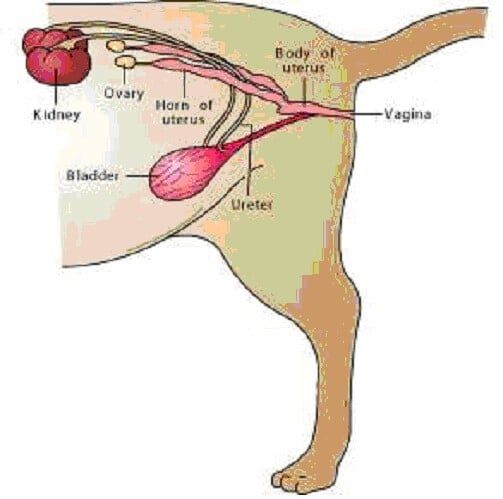
Are there other benefits to spaying my pet?
The most obvious benefit is the prevention of unplanned pregnancies. There is no medical or scientific reason for letting your pet have a litter before she is spayed.
Once a pet reaches puberty, usually at around seven months of age, she will have a heat or estrus cycle every two to three weeks for most of the year, unless she becomes pregnant. She will be “in heat” or receptive to mating for approximately one week in each cycle. During “heat” she may display unsociable behavior such as loud and persistent crying and frequent rubbing and rolling on the floor. This behavior coupled with her scent, will attract males from miles around. Removal of the ovaries will stop her estrus cycles.
When should I have my pet spayed?
Spaying should be performed before the first estrus or “heat cycle”. Most pets are spayed between 5 and 7 months of age. It is possible to spay your pet if she is pregnant or in "heat".
What does a spay surgery involve?
This is a major surgical procedure that requires a full general anesthetic. You will need to fast (no food or water after midnight) your pet the night prior to surgery. Most pets are able return home on the same day of surgery. The operation is performed through a relatively small incision made most commonly in the midline of the abdomen, just below the umbilicus. Both ovaries are removed along with the entire uterus. The surgical incision will be closed with several layers of sutures. In many cases, skin sutures will be placed, and these will dissolve, a recheck appointment is required in 5 - 7 days following the surgery.
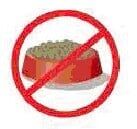
Are complications common with spaying?
In general, complications are rare during spaying of pets. However, as with all anesthetic and surgical procedures, there is always a small risk. The potential complications include:
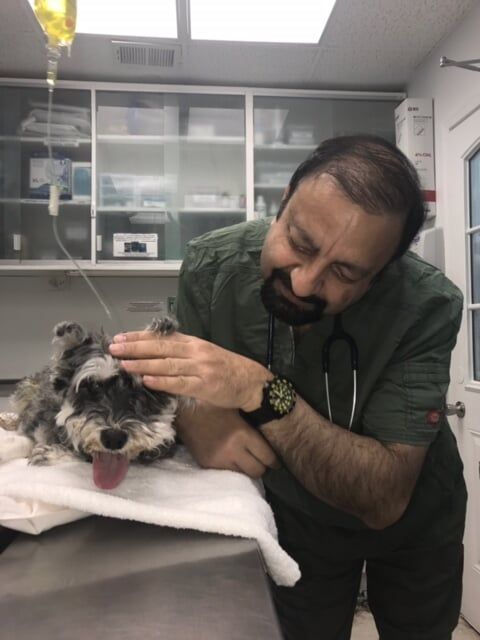
Anesthetic reaction
It is possible that any individual animal could have an adverse reaction following the administration of a drug or anesthetic. Such cases are impossible to predict, but are extremely rare. Pre-operative blood work and EKGs are useful screening tests that may detect preexisting problems which could interfere with the pet's ability to handle the anesthetic drugs.
It is important that you properly fast your pet prior to surgery according to your veterinarian's instructions. In addition, any signs of illness or previous medical conditions should be reported to your veterinarian prior to any sedation, anesthesia or surgery.
Internal bleeding This can occur if a ligature around a blood vessel breaks or slips off after the abdomen has been closed. This is very rare, and is more likely to occur if the pet is extremely active. Clinical signs include weakness, pale gums, depression, anorexia or a distended abdomen.
Post-operative infection This may occur internally or externally around the incision site. In most cases the infection can be controlled and prevented with antibiotics. This most commonly occurs when the pet licks the site excessively or is in a damp environment.
Sinus formation or Suture Reaction Although extremely rare, occasionally the body will react to certain types of suture material used during surgery. This results in a draining wound or tract that may appear up to several weeks after the surgery was performed. Often a further operation is required to remove the suture material.
Will spaying have any affect on my pet?
In the vast majority of pets, there are absolutely no adverse affects following spaying.There are many myths and rumors that are not supported by facts or research. Be sure to address any questions or concerns you may have with your veterinarian prior to surgery.
WHAT IS A MALE NEUTERING OR CASTRATION PROCEDURE?
Surgical removal of testicles under general anesthesia. Recommended Age of Procedure: Between 5-7 months of age.
Reasons to have your pet neutered: Prevents unwanted pregnancies by eliminating the chance of your male mating with females. Minimizes aggression, makes a pet more agreeable and docile.
Eliminates the chances of testicular cancer, prostate cancer, marking behavior, and is known to prolong age span of the pets.
It is a responsible thing to do for your pet and for society. (Millions of unwanted puppies and kittens are put to sleep every year in America, because many animals get unwanted pregnancy and there are not enough homes to adopt all these puppies and kittens)
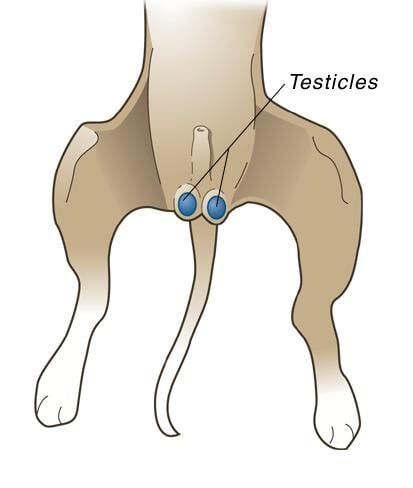
Feline Neutering
What is meant by castration or neutering?
Neutering and castration are the common terms used to describe the surgical procedure known scientifically as orchidectomy or orchiectomy. In this procedure, both testicles are removed inorder to sterilize a male cat.
Why should I have my cat neutered?
Neutering is very beneficial to the health of the cat, especially if performed at an early age. Following puberty, which occurs at approximately eight to nine months of age, the male cat often develops a number of undesirable behavioral changes. He will become territorial and start to mark areas, even inside the house, by spraying urine. This urine has a particularly offensive odor and is difficult to remove. As the tomcat reaches sexual maturity, he will start to enlarge his territory, straying ever farther from the house, particularly at night. It is for this reason that many of the cats that are hit by automobiles are non-neutered males. By increasing the size of his territory, he increases the likelihood that he will come into contact with other cats and will get into fights for territorial dominance. Inflicted fight wounds can result in severe infections and abscesses. Diseases such as FIV and FeLV, which can cause AIDS-like syndromes and cancers in cats, are spread through cat bites, these cats are most commonly affected by such incurable diseases. Last, but not least, neutering prevents unwanted litters and the needless deaths of tens of millions kittens and cats each year. The longer a tomcat sprays and fights, the less likely neutering will stop these behaviors.
When should I have my cat neutered?
In most cases, it is recommended to neuter your cat before the onset of puberty. Puberty normally begins between six and ten months of age. The actual age chosen for castration will depend upon the preference of your veterinarian. Many veterinarians recommend castration at around five to seven months of age. Please contact Clark Animal Hospital for further details regarding their specific sterilization policies.
What does the operation involve?
Your pet will undergo a general anesthetic. You will need to withhold food for twelve (12) hours prior to surgery. However, your pet should have limited access to water during most of the preoperative fasting period. Your veterinarian will advise you how long to withhold water before surgery.
In male cats, both of the testicles are removed through a small incision in the scrotum. Since the incisions are very small, and since stitches may cause irritation of the sensitive skin of the scrotum, it is rare for the incisions to be sutured.
What surgical complications could arise?
In general, complications are rare during castration surgery, however, as with all surgical procedures, there is always a small risk: Anesthetic complication It is always possible that any pet could have an adverse reaction following the administration of any drug. Such cases are impossible to predict, but fortunately are extremely rare. One potential danger arises from the cat not being fasted properly prior to anesthesia. It is essential that all instructions are strictly followed. In addition, any signs of illness should be reported to your veterinarian prior to an operation. Post-operative infection This may occur internally or around the incision wound. In most cases the infection can be controlled with antibiotics.
What adverse affects might neutering have on my cat?
In the vast majority of cases no adverse affects are noted following neutering. In certain cats, notably the Siamese breed, the hair that grows back over an operation site may be noticeably darker, believed to be due to a difference in the skin temperature. This darker patch may grow out with the following molt as the hair is naturally replaced.
Canine Neutering
Most male animals (stallions, bulls, boars, rams, and tomcats) that are kept for companionship, work, or food production are neutered (castrated) unless they are intended to be used as breeding stock.
This is a common practice to prevent unacceptable sexual behavior, reduce aggressiveness, and prevent accidental or indiscriminate breeding. However, many dog owners choose not to neuter their male dogs, despite the benefits.
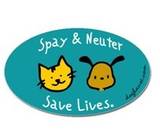
How does neutering affect behavior?
The only behaviors that will be affected by castration are those that are under the influence of male hormones (See below). A dog's temperament, training, personality and ability to do “work” are a result of genetics and upbringing, not its male hormones. Castration does not “calm” an excitable dog, and unless a castrated male dog is overfed or under-exercised, there is no reason for it to become fat and lazy.
What is a canine castration?
Castration or neutering of male dogs is surgical removal of the testicles (orchidectomy). The procedure involves general anesthesia. An incision is made just in front of the scrotal sac and both testicles, leaving the sac intact. Vasectomies are not performed since it is both sterilization and removal of the male hormones that provide the behavioral and medical benefits.
(a)
Case studies show that for roaming there was moderate improvement in 70% of dogs with marked improvement in 40%. For mounting there was moderate improvement in 70% of dogs with marked improvement in 25%.
(b)
In one study, castration led to reduced aggression toward other dogs in the house in 1/3 of cases, towards people in the family in 30% of cases, towards unfamiliar dogs in 20% of cases and towards unfamiliar people in 10% of cases.
Which of my dogs' behavior problems can be expected to improve following castration?
As mentioned, only those behaviors that are “driven” by male hormones can be reduced or eliminated by castration. Although the hormones are gone from the system almost immediately following castration, male behaviors may diminish quickly over a few days or gradually over a few months.
Undesirable sexual behavior: Attraction to female dogs, roaming, mounting, and masturbation can be reduced or eliminated by castration.
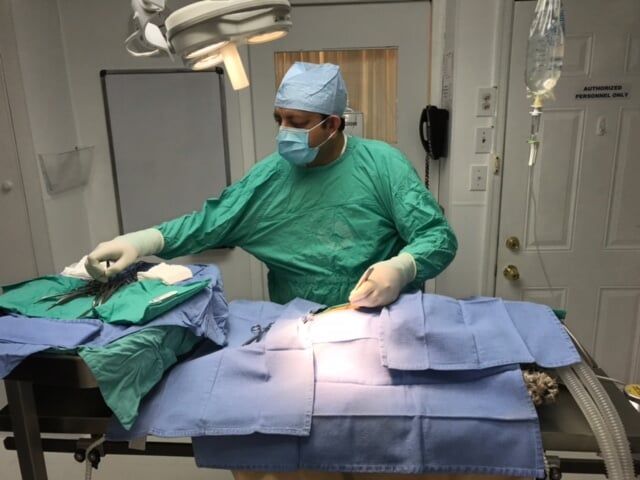
Urine Marking:
Most adult male dogs lift their legs while urinating. Instead of emptying their bladders completely, most male dogs retain some urine to deposit on other vertical objects that they pass. Some males have such a strong desire to mark that they also mark indoors. Castration reduces marking in 80% of dogs with a marked improvement in 40%.
Aggression:
Every aggressive dog should be castrated. At the very least this will prevent reproduction and passing on of any genetic traits for aggression. Castration may also reduce or eliminate some forms of aggression (i.e. those that are influenced by male hormones).
Are there any additional benefits to castration?
Medical benefits: Castration eliminates the possibility of testicular cancer and greatly reduces the chance of prostate disease, two extremely common and serious problems of older male dogs. Many older dogs that are not neutered will develop prostate disease or testicular tumors if they survive to an old enough age. Castration can also reduce the risk of perianal tumors and perineal hernias.
Population control:
Perhaps the most important issue is that millions of dogs are destroyed annually at animal shelters across the United States and Canada. Neutering males is as important as spaying females when it comes to population control.
Are there any risks?
Nowadays, with the broad selection of anesthetic agents and state of the art monitoring, anesthetic or surgical complications rarely occur during a canine castration. Most young and healthy animals recover without incident. Often, the biggest concern is not the surgery and anesthesia, but the recovery, since we need to ensure that the dog does not lick excessively at its incision line until it is fully healed. Constant monitoring, bitter tasting creams, or a protective collar, known as an Elizabethan collar, will be required if excessive licking is observed following castration. When castration is being considered for an older dog, the benefits must be weighed against any risks associated with anesthetic and surgery. Since castration surgery is seldom associated with any complications, it is the anesthetic that is the primary concern. If castration is being considered as a separate procedure for a medical reason (prostatic enlargement, testicular tumors, perianal tumors), then there is a significant benefit to the dog's health, comfort and perhaps longevity, in having the castration performed. If the dog is exhibiting any undesirable behaviors that might be improved by castration (roaming, masturbation, mounting, interdog aggression, excessive sexual interest or marking), there may also be a significant benefit to be gained from castration. Although not infallible, a physical examination, a series of blood and urine tests and any additional screening that your veterinarian may feel is warranted for your dog (e.g. EKG, chest radiographs), can help to determine if your pet has any significant anesthetic risks. These tests can also help the veterinarian determine which anesthetic protocol would be safest for your pet. Since many older pets require anesthesia for other procedures (e.g. growth removal, preventive dentistry), the benefits can often be further increased, and the number of anesthetic procedures reduced by performing the castration along with the other procedure.
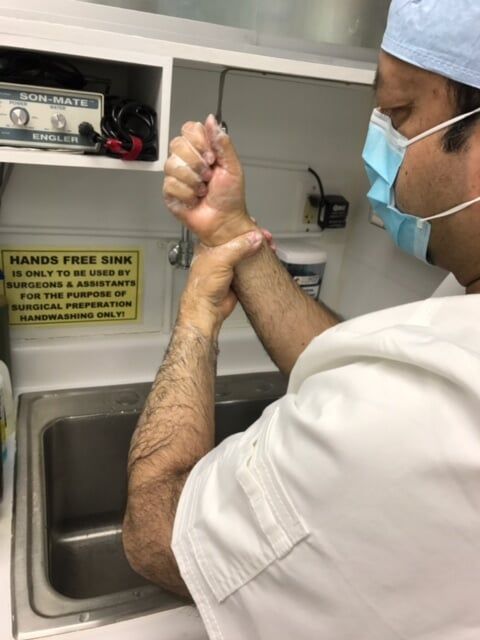
Once dogs are adopted into their new homes, most veterinarians recommend waiting until all vaccinations are complete before admitting the pet into the hospital for surgery. However, if general anesthesia were needed prior to the vaccinations being completed for any other reason (e.g. suturing a cut, removing quills) this would be an excellent time to consider castration. In summary, there seems to be no behavioral or medical benefit to waiting until a dog is “mature” to perform a castration.
What age is best for preventive castration?
A number of studies have shown that castration is just as effective at reducing male associated behavior problems as it is at preventing them. This means that whether the pet is castrated post-pubertally (e.g. 1 year or older) or pre-pubertally (e.g. before 6 to 9 months of age) the behavioral effects are likely to be the same. There is, however, anecdotal evidence that dogs that are sexually experienced are more likely to retain their sexual habits after castration, compared to those dogs that have had little or no sexual experience prior to castration. It has been advocated recently that castration be performed at as young an age as is practical, to ensure that it is done before the pet has a chance to breed. This is most important in animal shelters, since it allows them to ensure that every dog adopted has already been castrated. Many shelters now routinely begin neutering as young as two months of age. To date, studies have shown that castration at this early age is safe, and has no long-term effects on health or behavior, regardless of the age that it is performed. It has been suggested that surgery at this age is shorter, that recovery is quicker, that there is with less post-operative discomfort for these younger animals. However, if castration is performed before all permanent (adult) teeth have erupted, your dog should be rechecked around 6 months of age to insure that no deciduous (baby) teeth have been retained.
My dog has retained testicles - what does this mean?
During fetal development or shortly after birth, the testicles will descend into the scrotal sac. In some dogs, likely due to a genetic predisposition, the testicles may not descend into the scrotal sac. These dogs are known as either unilateral (one testicle) or bilateral (both testicles) cryptorchids. The testicle may be retained in the abdomen or anywhere between the abdominal cavity and the external sac. Retained testicles do not usually produce sperm, but they will produce hormones, which can lead to any of the behavioral changes or medical problems previously discussed. In fact, some studies have shown that retained testicles may be more prone to developing cancer. At the very least, it would be extremely difficult to determine if a testicle, which is located in the abdomen, begins to develop cancer, since it cannot be palpated. All dogs with retained testicles should be neutered (and both testicles removed) for medical and behavioral reasons, and to ensure that this genetic abnormality is not perpetuated.
Before the Surgery:
The night before the surgery, do not feed your pet anything (food/water) after 10 P.M. The next morning, drop off your pet, empty stomach, at CLARK ANIMAL HOSPITAL
around 8:30 A.M. The surgery is performed by one of our veterinarians on staff, and the pet is monitored. Some pets can go home the same day, and some pets sre kept overnight to be seen the next morning by our veterinarians. Next day, the pet is released with some pain-killers, anti-inflammatory medications and antibiotics.
Although all tests mentioned in the section on Enhanced Care can be done ON THE DAY OF SURGERY, you may get some of them done in CLARK ANIMAL HOSPITAL
upto 4-5 days in advance. This test evaluates the liver function, kidney function, Red Blood Cells and Hemoglobin, among dozens of other parameters. The test makes it less risky for the patient to undergo surgery, by outlining any possible abnormalities.
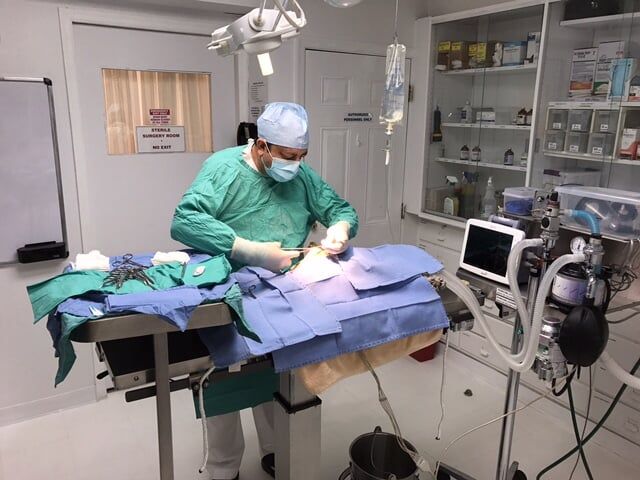
ADDITIONAL SURGICAL SERVICES
Return to Top
Gastropexy:
Attaching stomach to the internal body body wall to avoid Gastric-Dilatation-Volvulus also called "fatal bloat", especially in large breed dogs.
Gastrotomy:
Opening and suturing the stomach, as in to remove foreign objects
Cystotomy:
Urinary bladder surgery, as in bladder stone removal
Perineal Urethrostomy:
Surgical removal of penis to avoid repeated urinary passage blackade in male cats
Anterior Cruciate Ligament Repair:
by Lateral Imbrication method. This is open knee joint surgeryLuxating
Patella Surgery:
For dogs who show hopping gait or lameness because of luxating patellas, we perform corrective surgeries.
Intestinal Anastomosis:
Cutting off disease intestine and joining healthy portions together
Sub Total Colectomy:
Partial removal of diseased colon, as in cats that have mega-colon and resulting constipation and obstipation
Cherry Eye Correction:
We offer both the "Tuck" and "Cut" method
Ectropian Eye Surgery:
in pets that have outward curling and drooping eyelids
Entropion Eye Surgery:
for pets that have inward curling eyelids
Pyometra:
in un-spayed pets whose uterus has become infected and filled with pus
Anal Gland Surgical RemovalEar Hematoma RepairTumor Removal of the mammary glandTumor Removal of outer chest and abdomen
A day before surgery:
Do not feed your pet any food or water after 10 PM the night before the surgery. You should drop off your pet at the Clark Animal Hospital
at approximately 8:30 AM the day of the surgery. Spays and neuters are released the next day, and cat declaws after two nights. Call us if you see any problems like pain, bleeding, crying, lethargy, weakness, absence of urination or defecation, or any other symptoms that are concerning to you, after you take the pet home after surgery. These symptoms may or may not be serious, because every pet respond totally differently than other pets to anesthesia and surgery. All post operative complication care is done in the hospital and is free of charge.
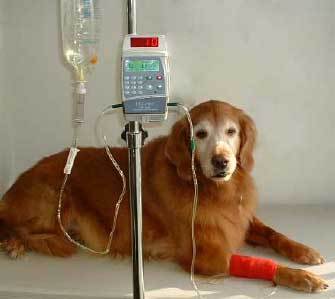
HOSPITALIZATIONS:
Return to Top
We treat sick pets either as outpatients or In-hospital patients. Pets that are sick but are otherwise in a stable condition, (i.e. eating drinking, breathing, walking normally, defecating and urinating normally) are usually treated and released the same day with medications and instructions to take home with.
Clark Animal Hospital is not yet a 24/7 hour facility and does not offer overnight monitoring. Unstable patients can be kept, treated and monitored at our hospital during regular business hours. If a pet is deemed critical/unstable and needs overnight monitoring as determined by our veterinarians, your pet will then be transferred to or you will be given a referral to your nearest 24/7 veterinary emergency facility. Patients can be transported back to CAH by the client the next morning for continued care.
Patients who are sick but stable (no imminent danger of deteriorating) are kept in CAH as hospitalized patients until cured. Based on their specific needs, we will provide them with intravenous fluids, pain killers, special diets/foods, antibiotics, anti inflammatory medicines, oxygen cage, oxygen mask, treatments, check-ups, clean cages, blankets & diligent monitoring by our qualified technicians and doctors during their stay. At night, they are allowed to sleep over in the hospital and are checked routinely the next morning. There are therefore no attendants at night time. This is the accepted method all over the USA in regular animal hospitals.
You the pet owner is welcome to visit your hospitalized pet any time during business hours as long as prior arrangements are made. If prior arrangements cannot be made, you are still welcome to visit your pet, but we cannot guarantee that a doctor will be able to talk to you. However, we will do our our best to accommodate your needs.
VISITING YOUR HOSPITALIZED PETS IN CLARK ANIMAL HOSPITAL
We encourage you to visit your hospitalized pet. Please call in advance, keep the number of visitors (in each visit) to less than 3, the time for visitation (for each visit) less than 30 minutes, and the total number of visits to a maximum of two visits per day. While visiting, please do not manipulate intravenous catheters or other medical devices attached to your pet. Please do not feed your pet your any foods that you have brought from home without asking the doctor handling your pet's case if it is OK to feed the particular food that you have brought.
Please designate ONE person in your family as the liaison person. That person will communicate with the hospital in all matters pertaining to your pet. That person will communicate with ONE person that we will designate as the liaison person representing the Clark Animal Hospital (Usually the doctor handling your pet's case). We do this to achieve a high level of communication between the Hospital and the pet owner, while minimizing communication errors on both sides.








